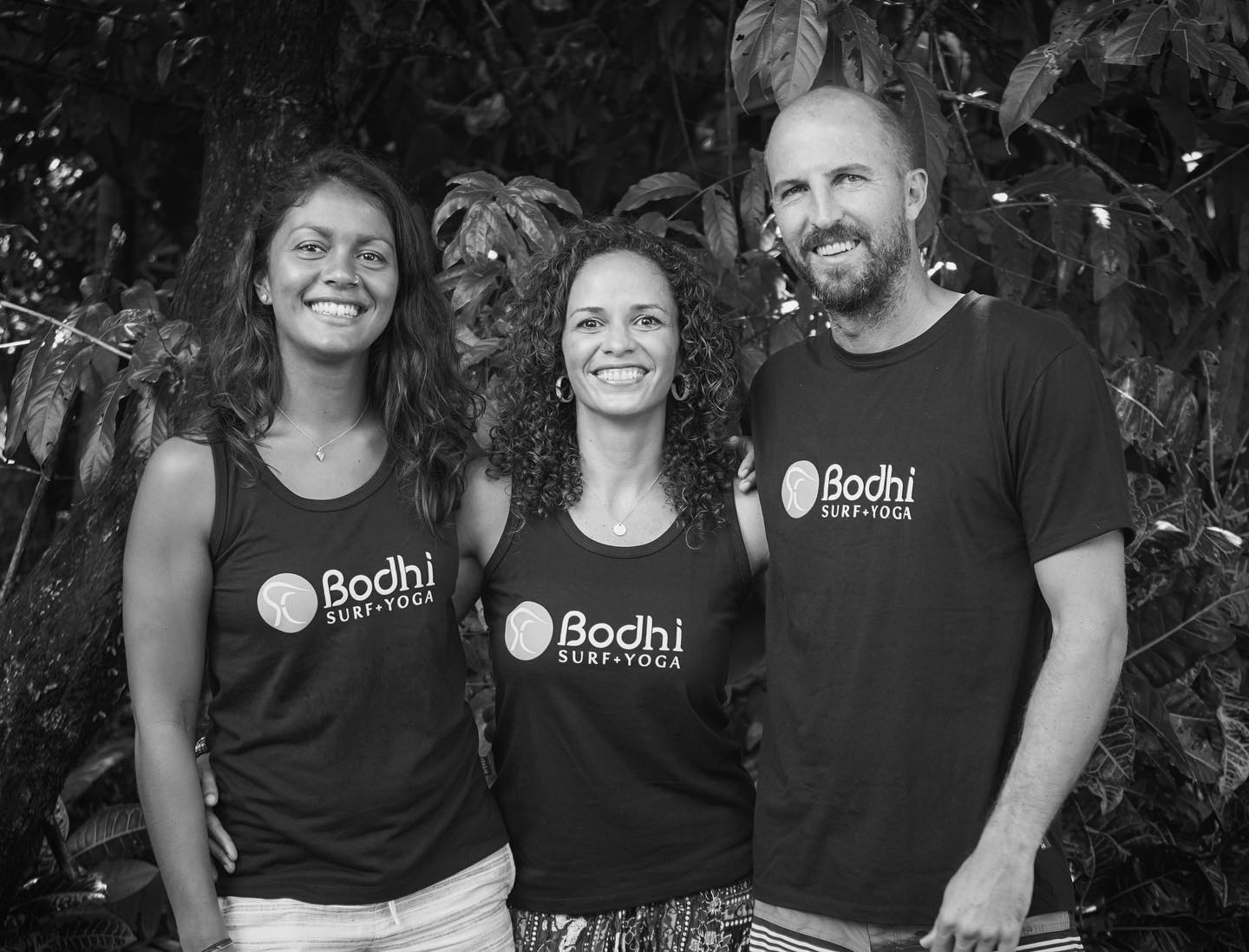For Bodhi Surf & Yoga, in many ways, the B Impact Assessment journey started with a logo.
“It really was Patagonia that inspired us,” says Travis Bays, who co-founded the retreat in Bahía Ballena in 2010. “I loved the innovation Patagonia was implementing in their business model, and I noticed that they had this little logo: B Corps Certified. I started doing a little bit of research and found that this was a really neat tool…. and that there were other businesses that had this logo, like Klean Kanteen.”
He started talking to colleagues about the idea, and—as so often seems to happen in Costa Rica—the cards fell into place when a friend happened to meet a regional B Corp leader at a conference in Liberia, Guanacaste. Travis soon found himself having coffee with that leader in San José, and “next thing I know, I was in the process.”

Like the other Certified B Corp leaders we’ve interviewed for this month’s edition, Travis says that the Assessment reflected values that the company already had. However, like many small businesses, Bodhi’s operations were stored in its co-founders’ heads, so the initial process required a lot of document-gathering and calculations.
“The great thing was, Bodhi had the mission-driven model built into its DNA,” he says. “But we weren’t tracking [everything]… We had to calculate, for example, the amount of hours people are receiving education through yoga, through surfing, through our community walks, and how much time we were spending developing the curriculum.”

He also contrasts the process back then, which he estimates took Bodhi between 120 to 160 hours of staff time, to the interactive, fully web-based assessment available today, where users can ask for examples if a question is confusing.
“The process wasn’t as streamlined and digital as it was today,” he remembers. “It was using a lot of Excel sheets, compiling information, questions that weren’t clear.”
Bodhi Surf & Yoga became a B Corp with a score of 98.8 in November 2016. Since then, Travis and his co-founders—his wife, Pilar Salazar, and Adrianne Chandra Huff—have gone on to achieve not only B Corp recertification with a significant score increase to 121.5, but also Best for the World status for the Community impact area every year starting in 2017. According to the global nonprofit B Lab, which oversees the global certification process, Best for the World is a special recognition that grants to “the B Corps that “have achieved the highest verified scores in the five impact areas evaluated on the B Impact Assessment.” In its most recent recertification in 2020, Bodhi achieved a whopping Community score of 53.8.
So what does the Community section of the assessment measure?
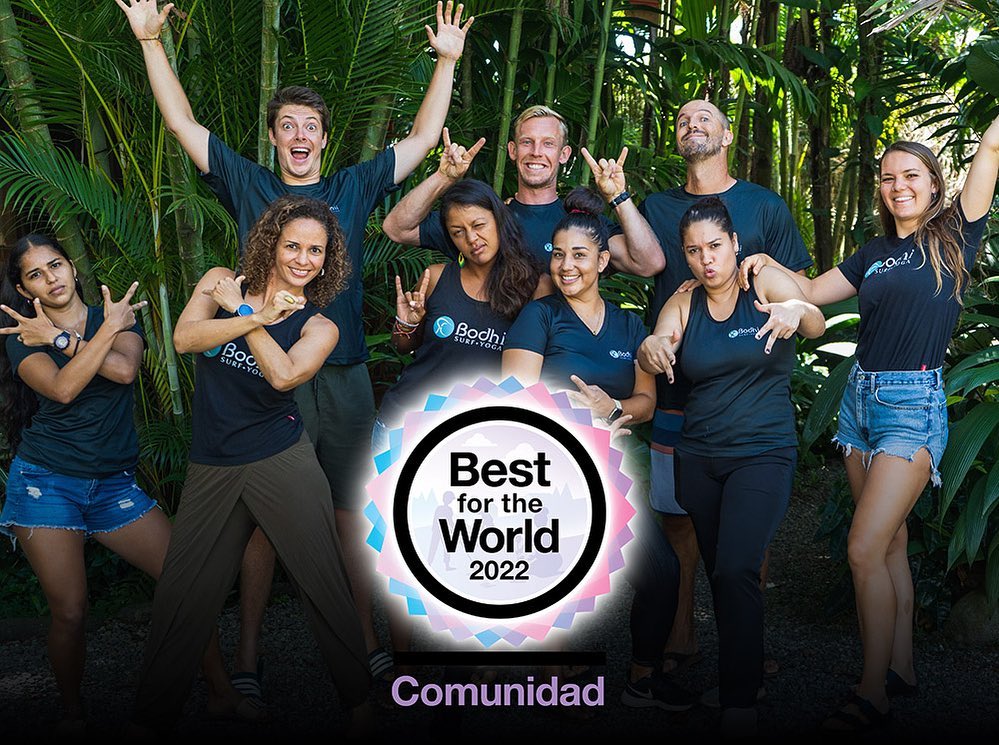
The B Assessment’s community impact area
The Community section “evaluates a company’s engagement with and impact on the communities in which it operates, hires from, and sources from,” according to the free online B Corp self-assessment. It divides its questions into five main topics: diversity, equity & inclusion, economic impact, civic engagement, charitable giving, and supply chain management.
As with the other five impact areas, the Community section offers companies a shot at showing that they have an Impact Business Model that benefits the community. That is, is the business not only generating positive impact on its community, but actually designed to create that specific outcome? Examples given on the assessment website include a business model based on sourcing from or selling to local stakeholders, or structured as a producer-owned cooperative. Bodhi Surf, which built this impact area into its mission by making community engagement and traveler’s philanthropy a crucial part of the experience they offer to travelers, has certified its community business model.

(The assessment explains that most B Corps have 0-2 Impact Business Models; many companies achieve positive impact in the five areas without using a business model that’s specifically designed for that result. For example, a hotel might donate heavily to community causes, source from community providers, and represent community members on its board, without having any of those activities as a part of their business model.)
From there, the section takes companies through the diversity of their ownership, leadership, and suppliers; their economic impact on their communities through job growth and purchases from local suppliers; their corporate giving and volunteering; and their supply chain policies.
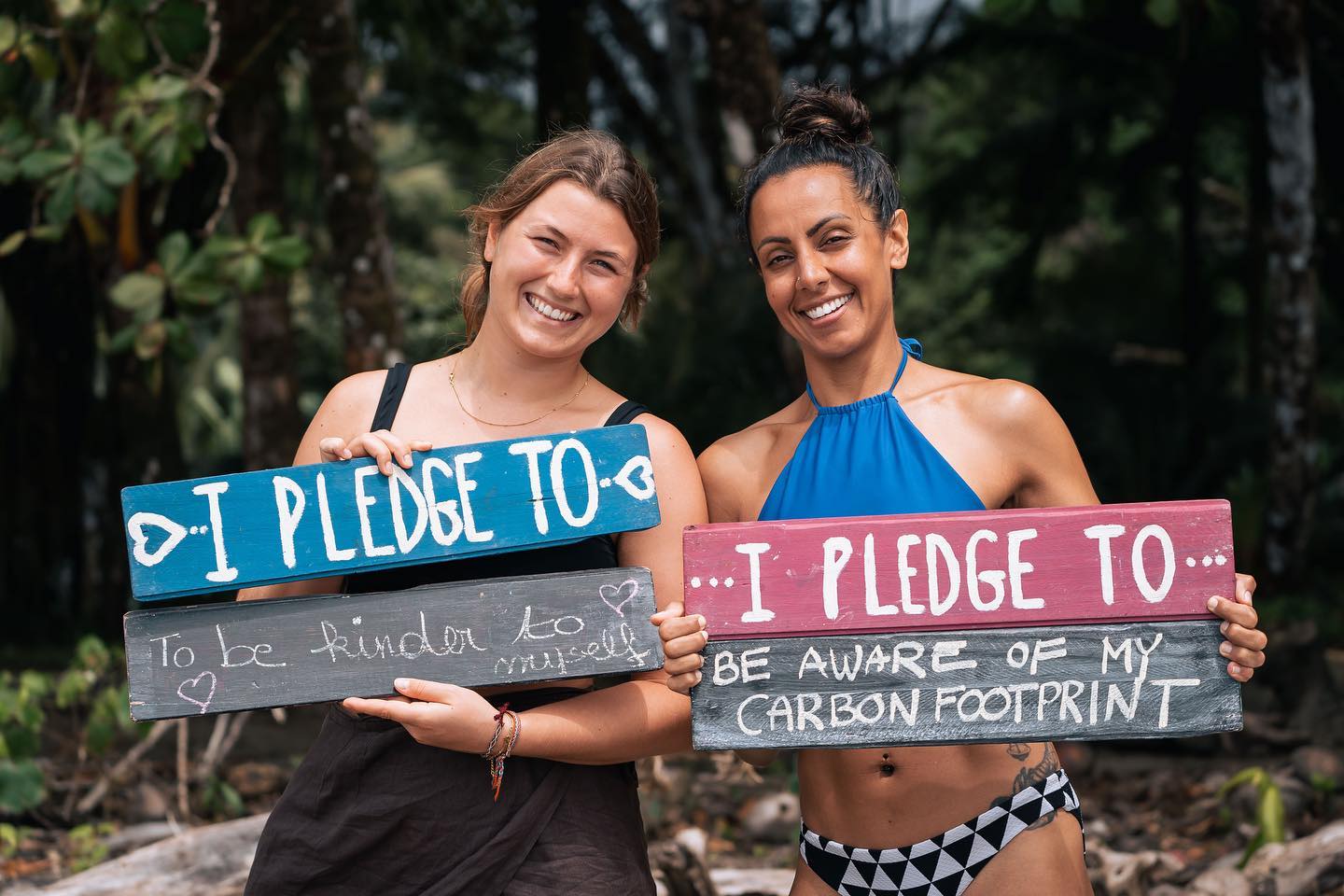
Adapting the community impact area to Costa Rica
Travis says that the community impact area of the assessment helped Bodhi Surf & Yoga improve its operations in two key ways: the way it prioritizes and structures its own definition of community, and the way it helps employees to increase their community impact.
“We look at community as a few things,” he says. “Our staff is community. We look at our customers as community. We look at our premises as a property, as a community. We look at the District of Bahía Ballena as a community, and so forth. So we try and make sure that we use the assessment to figure out like, where are we really having the most impact, and how can we continue to do that? The assessment helped us align things a little bit better.”
As one example, the assessment helped Bodhi’s leaders review the impact of their Travelers’ Philanthropy Program—through which Bodhi makes a community donation for every guest and invites those guests to match this with their own donation—and challenge themselves to take it to the next level.
“We consolidated the program to make sure that we are not just giving [donations] away to any organization, but to a community foundation that’s working in the Bahia Baiana district versus some of these international organizations that we give to,” he says. “And we donate our vacation packages to nonprofits that work around the world so that they can use the vacation package as a way to generate funds so they can continue doing their good work.”
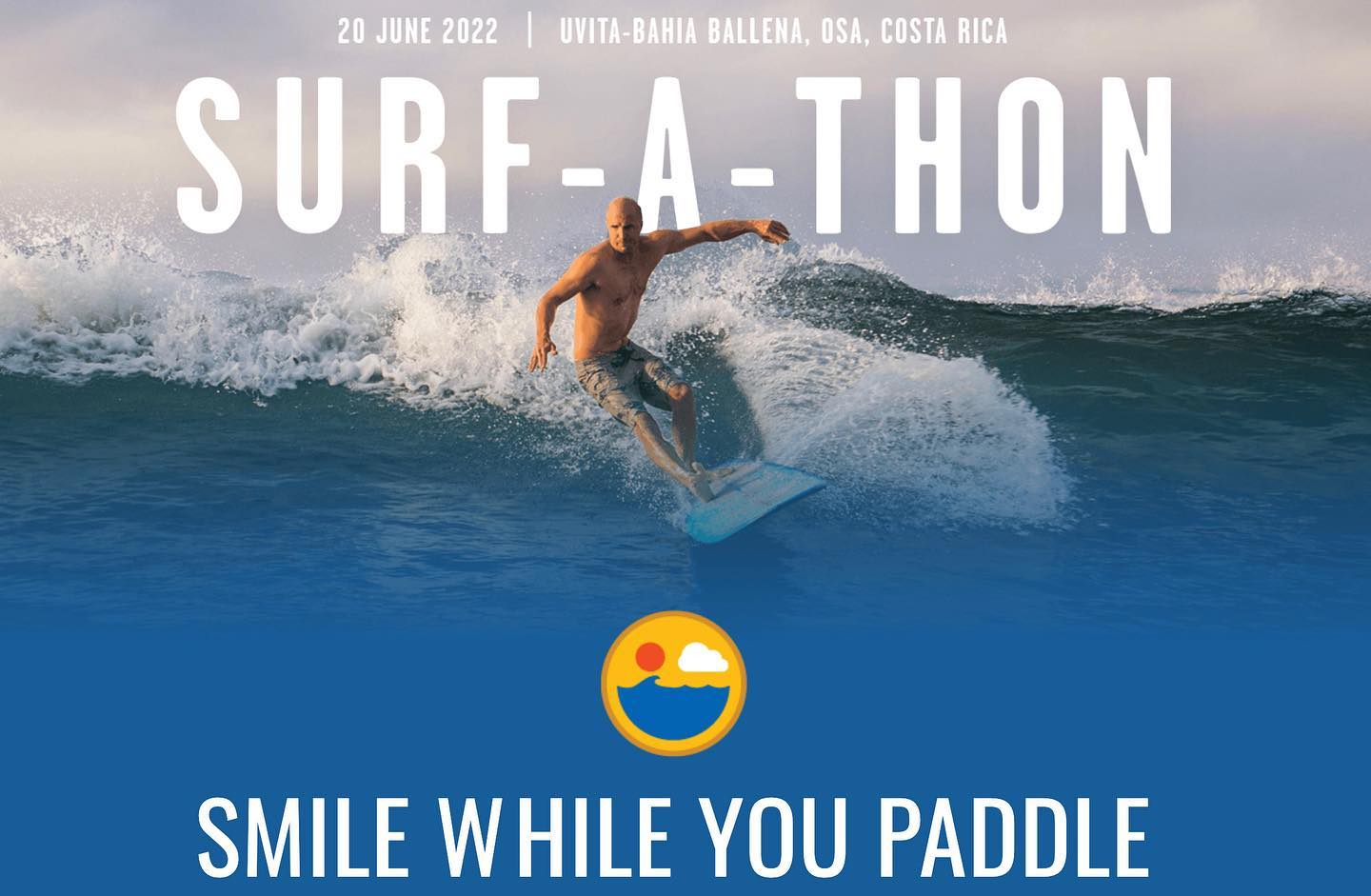
The assessment’s questions about staff’s community engagement led Bodhi to structure and prioritize paid volunteer options for staff members. The company allows employees to volunteer with local organizations during paid work hours, and has recently started promoting this opportunity more heavily, with the result that employees are not only making a positive impact but also bringing back useful information that could help Bodhi’s ongoing efforts to increase and improve its waste management, another key element of the B Assessment.
“The other day it just so happened that a nonprofit organization was having a beach cleanup at Playa Hermosa, which is one of the more visited beaches and has a lot of plastic and trash. Three of our employees went… and learned a lot, too, because the nonprofit organization was not only just collecting trash, but they were separating it. They started to come back with some information, which was really cool.”
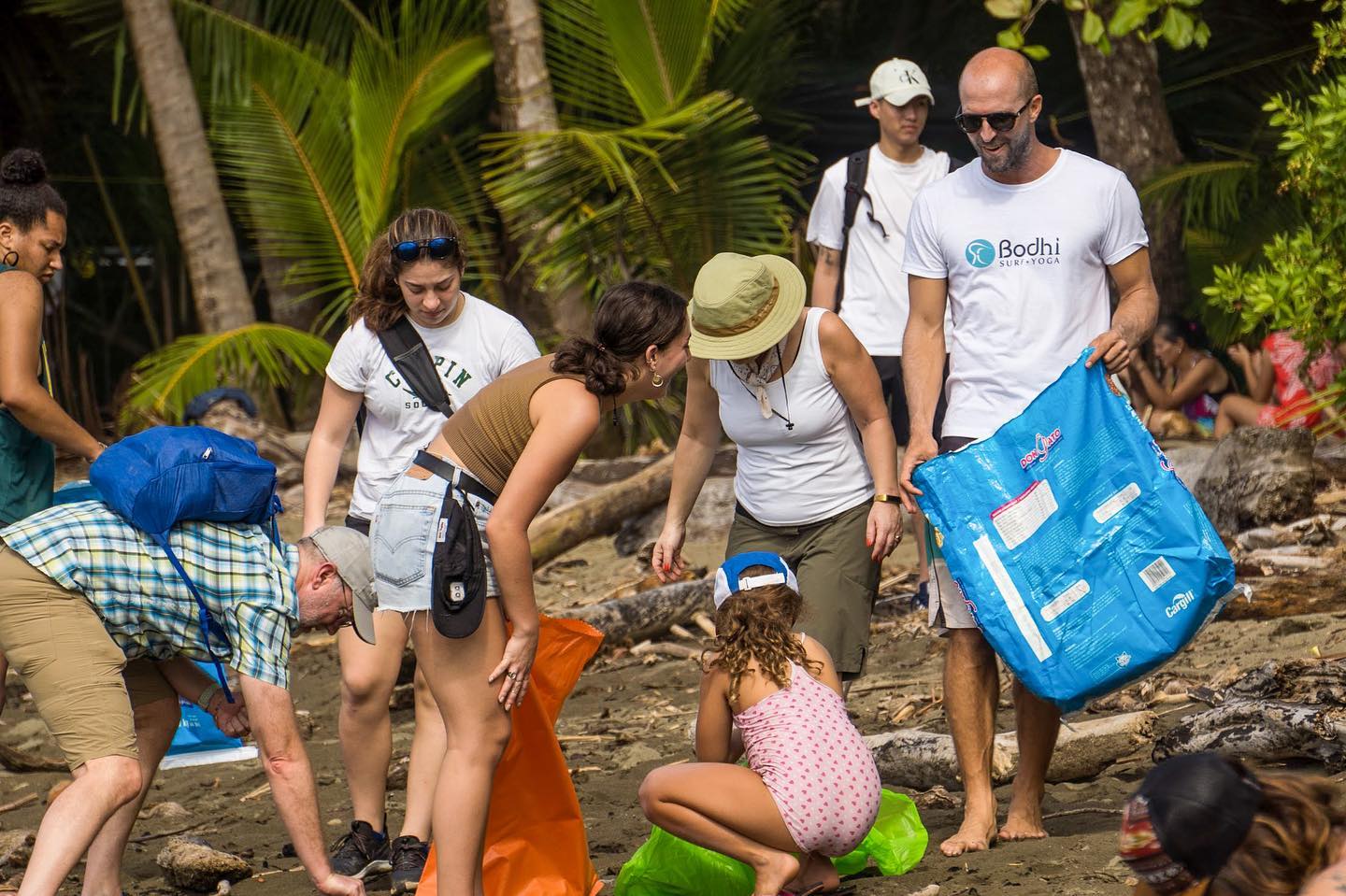
Asked what the limitations of the assessment are when it comes to community impact, Travis zeroes in on a lack of alignment with the sector he represents, Costa Rica’s largest industry. Bodhi Surf & Yoga is one of only three tourism sector B Corps in Costa Rica to date and two accommodations, along with Casitas Tenorio B&B in Bijagua. Travis says that the assessment could do a better job addressing bigger impact questions that are specific to tourism and to rural communities.
“One thing that the assessment doesn’t capture in tourism, specifically, with respect to community, is the social impact that visitors have on a community,” he says. “There are positives and negatives, such as the gentrification that’s happening because of tourism and because of people visiting the area and then wanting to buy a piece of property. The assessment is not capturing whether we’re a part of that problem or part of that solution. And it’s a big deal.
“How are we addressing affordable housing in a tourism destination? That’s a huge question that a responsible business should be addressing, and I don’t know that it’s being addressed in the Impact Assessment,” he continues. “What is my responsibility to ensure that our employees, for example, have access to affordable housing so that this doesn’t turn into a destination whereby it’s only for tourists and vacationers?”

Another huge priority for Costa Rican businesses, particularly in tourism, is safety and security, Travis points out, arguing that this topic is also under-addressed by the tool.
“As a nation, we’re through the roof” when it comes to crime, he says. “We’re not the exception down here, but we are attacking that problem, which is a result of many factors. I do believe that a lot of it has to do with the gentrification that’s taking place; after the pandemic, we’ve had a boom, a boom in people purchasing land down here. It’s impacting the community—in my opinion, in a not so fortunate way… So I think that businesses like Bodhi would hopefully go and be more active at the municipal level.”

Responsible tourism businesses should also educate and inform guests about these issues, he says.
“To be quite frank, [we need to] talk to our visitors about it. I have a gentleman here right now who’s interested in going and buying real estate. And I told him, here are the issues that are happening. Think about these things before you buy,” says Travis. “Thankfully, Bodhi attracts, for the most part, guests who want to be active community members, not passive. Our guests don’t want to just have a transactional relationship with the community. They do want to engage. They do want to figure out how to make this place a better place to live every single day.”
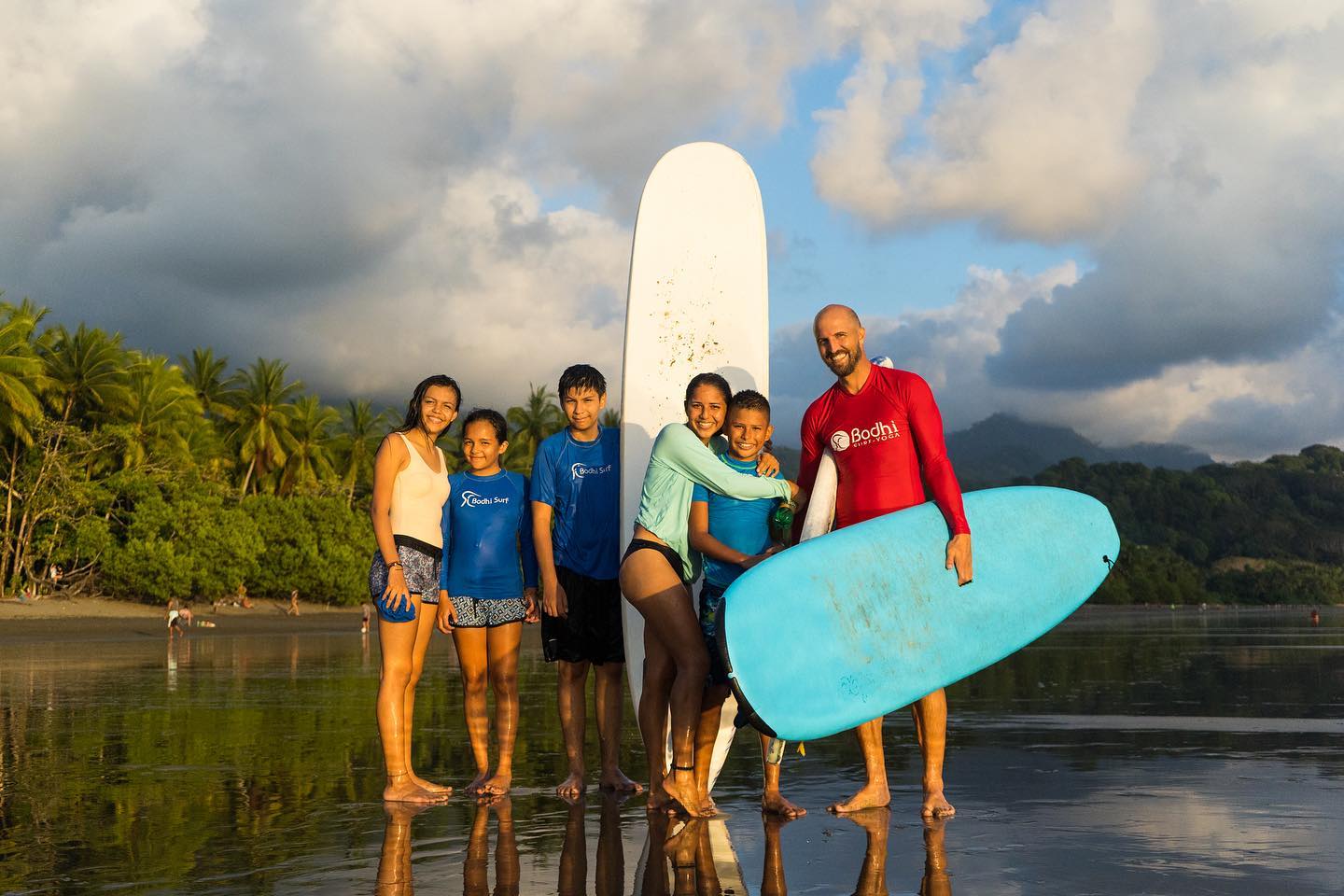
Benefits of the B Corp community
Is the B Impact Assessment worth it for Bodhi Surf & Yoga? Travis says the benefits have been clear. That’s because of the customers who mention that they chose Bodhi because it is a B Corp; the clarity and growth it has brought to the organization; and, not surprisingly, the sense of community it brings to entrepreneurship.
“In this day and age, there are a lot of of people and businesses that struggle to find community. One of the biggest benefits of becoming a B Corp or even just attempting it to is that you feel that you’re part of something, a movement whereby people are using business as a force for good. That, in and of itself, is like a really magical pill that gives you energy to continue moving forward,” Travis says. “And once you’re inside the community officially, then you have access to other businesses that think along the same lines more or less as you, and you can build strategic partnerships with them.
“We partner with Klean Kanteen to offer a loaner program, and with Badger Balm for sunscreen, with Aromas for shampoos and essential oils, with Florex—we use all of their products here. We’ve collaborated with Pucci Photo for our Ocean Guardian contest. We teamed with s.e.e.d., and their law firm, and with another certified company for our solar panels.”
As the movement grows in Costa Rica, it will be easier and easier for B Corps to show their certified value chains, he says: “It’s really neat to be able to say not only are we a Certified B Corp, but we actually do have a supply chain of service providers that are also B Certified.”
We are diving deep into the five impact areas of the B Assessment through the experiences of each of the Certified B Corporations that are supporting our March edition, “Measuring Up.” Read more about all of our sponsoring B Corporations here.


